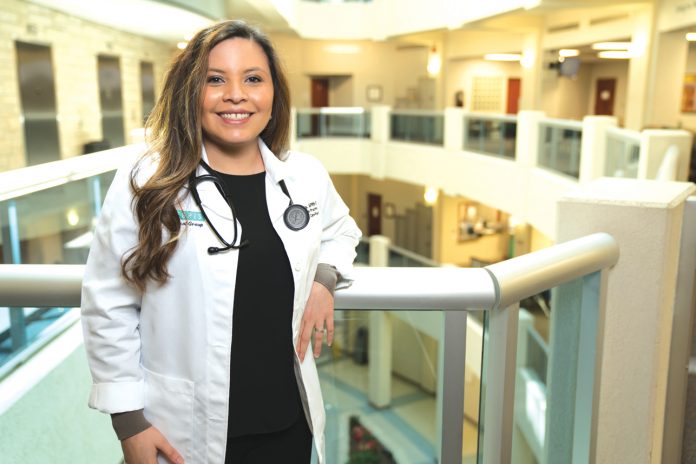by Bobby Anderson, RN, Staff Writer
Growing up in Oklahoma City, Ana Garcia, APRN-CNP, knew what it was like to be part of an underserved population.
The youngest of six children born to Mexican immigrants, her family moved to the United States seeking new opportunities.
Those opportunities sometimes seemed few, but when they arose, her family always took advantage of them.
With that kind of raising, it’s no wonder Garcia ended up with a terminal degree in the practice of nursing.
“It’s been great, really good,” Garcia said. “It’s been really personally life changing. We often think we are the ones who are treating patients but often times we get more out of them. I’m really happy to serve the community.”
“I really think this is my calling.”
Garcia graduated in 2015. She’s in her third year with Integris, now serving at the Southwest Family Clinic.
Garcia’s story is a true immigrant tale.
She was determined to break through the barriers that stood between her and a college education. Working hard just to provide for their family, higher education was a luxury they could not afford.
But while attending Bethany High School, Garcia excelled in school and began to dream of her future.
“I remember asking my high school counselor how I could go to college,” she said. “From that point on, I was determined to make straight A’s. I knew I didn’t have room to fail.”
Little did she know, her great opportunity would arise from another woman who, decades earlier, had overcome challenges of her own.
Born in 1924, Ruth Mershon wasn’t expected to live past the age of two. Her physical impairments made it difficult to walk or even wear shoes. Through her own tenacity and the support of her family, she persevered and graduated college in 1945.
At a time when few women practiced medicine, Mershon decided to become a physician – a career typically restricted to men. But World War II provided new opportunities for women, and Mershon became one of 11 women admitted to the University of Oklahoma College of Medicine that year. She went on to practice anesthesiology for 45 years.
“Ruth’s determination helped her overcome many obstacles in life,” said niece Ginny Lawrence. “She believed strongly that hard work reaps rewards, and she wanted to help capable, hard-working students achieve their goals.”
Dr. Mershon died in 2000, and while she and Ana Garcia never met, she gave Ana and many other students an incredible opportunity. Dr. Mershon established the Ruth Mershon Scholarship at the Oklahoma City Community Foundation.
Since 2000, the scholarship has helped students follow their dreams of going to college.
“This scholarship was life changing,” Garcia said. “It really validated all of my years of hard work.”
In a unique twist of fate, Garcia also entered the medical field. Today, she is a nurse practitioner serving families in southwest Oklahoma City, where 80 percent of her patients primarily speak Spanish.
“I know I’m here for a reason,” Garcia said. “God placed me in this profession to make a difference. As a child, I dreamed of working in medicine, and I’m honored to provide quality care for residents in the city I’ve always called home.”
Garcia’s niche has been the Spanish-speaking community. It’s one she discovered that had dramatic needs not being addressed.
“The care is very similar but the only difference is they haven’t had adequate access in Oklahoma City and surrounding areas,” she said. “We usually have to backtrack quite a bit. We usually see patients who have not received care in 10 to 30 years and so often you’re doing a lot of catchup in the beginning.”
Often that comes with a host of issues that patients were either unaware they had or hadn’t had a provider adequately address their needs.
“Everything from Type 2 diabetes to high blood pressure to cancer – I’ve seen it all,” Garcia said. “I continue to be perplexed how a lot of these things have been unnoticed or untreated for so many years.”
“Renal failure, heart failure, COPD that’s never diagnosed … it’s always interesting to see what walks in the door.”
The language barrier can be a huge part of that. Garcia’s ability to speak Spanish instantly breaks down that wall.
Her caring nature seems to take care of the rest.
“As a kid we were seven and 10 and translating for family members,” Garcia remembered. “I’ve been really grateful I’ve had this opportunity to truly understand what they’re going through, know what they’re thinking about and what their fears are.”
And that’s an opportunity she’ll take advantage of every time.













